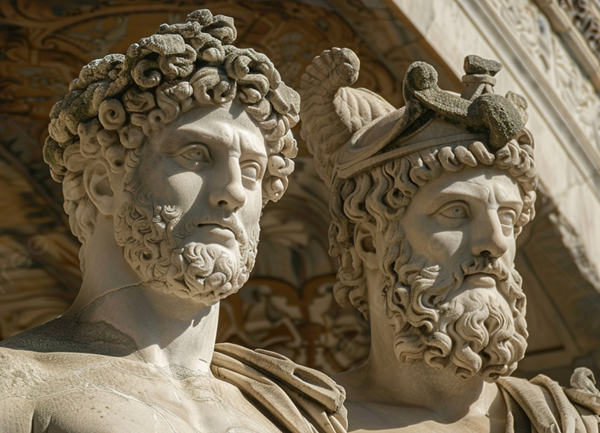Reading Luke/Acts Together #68 – Zeus and Hermes!!
Acts 14:8-20 is like a comic break in the action – or maybe that’s how Luke intended it. The story is laugh out loud funny. Comedy and theology are cousins; Karl Barth said that sin is taking oneself too seriously. Acts 14 narrates a hilarious scene that makes us laugh at ourselves, at lunacy in belief, and at the curious mercy of God.
Paul and Barnabas healed a man in Lystra. The people there didn’t speak Greek or Latin, so they couldn’t comprehend whatever Paul was saying in connection with the healing! And what can we say about Paul’s zeal, curing a man he couldn’t communicate with – well, except with love, human concern, and God’s power!
The Lystrans veered a bit toward sensational superstition. Legend had it that Zeus and Hermes once visited their region and no one welcomed them - until an elderly couple, Baucis and Philemon, took them in. On the lookout for a pair of walking divinities, the Lystrans saw the miracle Paul and Barnabas had accomplished. Amazed and delighted (and confused) they shouted, “The gods have come down to us in the likeness of men!” (Acts 14:11). Ironically, their mistake is close to the truth! God had in fact come down in the likeness of men – as Jesus, the one Paul tried to talk about, but then in Paul and Barnabas themselves, who were at that moment the Body of Christ in the world, the hands and feet of Christ.
Of course, the humor gets funnier when we realize Paul and Barnabas didn’t understand their language, so they had no clue they were shouting “The gods have come down to us in the likeness of men” until it was too late. All they could do then was to defer, to point away from themselves to the one they served. Maybe someone stepped in to translate when they declared “We also are men, of like nature with you, and bring you good news, that you should turn from these vain things to a living God” (Acts 14:15).
The Lystrans, like most people we know, were dizzy with the wondrous display, and didn't seem interested in what the miracle pointed to: good news! and Paul's insistence that they turn from false gods to the living God. Repent? We just want another miracle. This tendency in human nature explains why even Jesus, when he healed, hushed his disciples, fearing a tide of amazement would overwhelm his humble, holy purpose. Our superficial selves typically prefer power to the person - and in Lystra, the crowd whipped themselves into a frenzy.
Maggie Ross once wrote that there are always those who want an experience of God more than they really want God! We want to feel good, to have things go smoothly, to enjoy a boatload of blessings - but miss out on a relationship with the living God, far more precious than any "thing" or experience we might fantasize about.
Not surprisingly, when the people realized Paul and Barnabas weren't really gods, and refused to be miracle machines, they were beaten and ushered out of town. In the Bible's judgment, those who suffer for Christ prove more than those who succeed or impress others with their piety or newsworthy ministries. Dietrich Bonhoeffer, in prison for his faithfulness, wrote that "personal suffering is a more effective key, a more rewarding principle for exploring the world in thought and action than personal good fortune."
Perhaps, instead of fawning over religious leaders who dazzle with their smiles and feats, we might look for those who bear much pain for their faith - and see if we can find ourselves as close to our suffering Lord as they are. We may even learn to laugh, not taking worldly circumstance too seriously, giddy with the delight of being fools for Christ.
